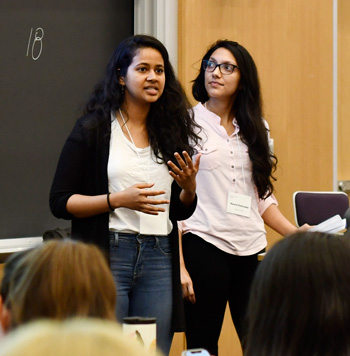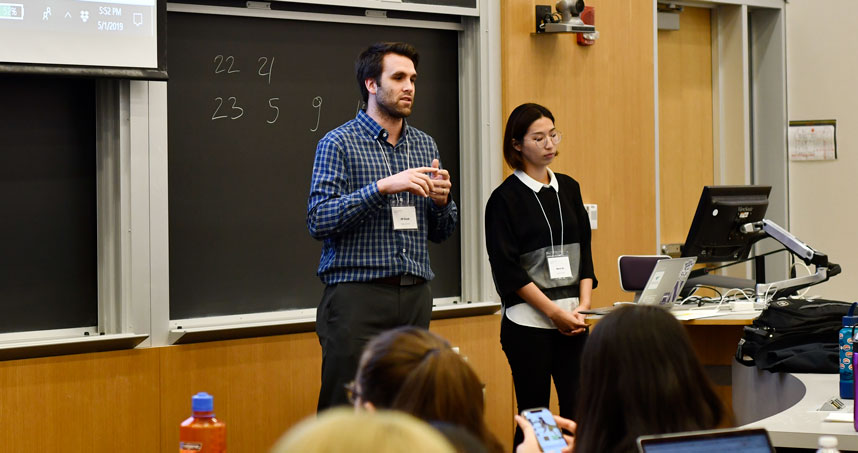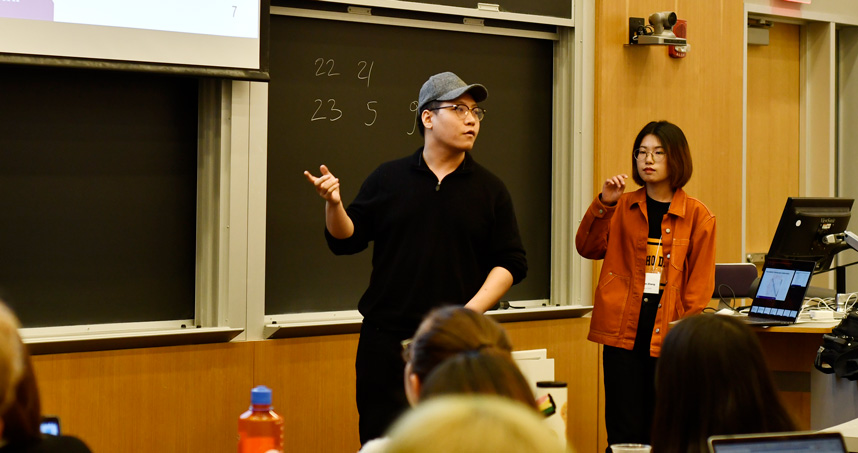MSiA Hackathon Explores Business Opportunities Using Credit Data
The Master of Science in Analytics program partnered with ABC Supply Co. for the sixth annual competition
With more than 700 branches, ABC Supply Co. works with thousands of contractors every year to support construction and building projects. One of the leading wholesale materials distributors in the United States, the Beloit, Wisconsin, company offers its customers innovative credit programs, allowing contractors to purchase materials for roofing, siding, and windows, and pay the company back at a later date with minimal interest.
With these credit programs a vital aspect of its business, how can ABC Supply expand future credit opportunities with customers and monitor operations more wisely? Northwestern Engineering Master of Science in Analytics (MSiA) students Joseph Cook and Nuo Xu turned to the data for solutions.
Winners of MSiA’s sixth annual Hackathon on Wednesday, May 1, Cook and Xu analyzed credit and revenue data across all ABC Supply branches to explain the contributing factors of why some branches were handling credit extensions better than others. The team used data aggregation and PCA cluster modeling to study ABC Supply branches across multiple datasets, including revenue per account, average credit line, and average past due amount.
Charting the data as three indexes — prosperity, credit usage, and bad credit — the team found several distinct clusters of branch performance emerge. High-performing branches, for example, carried large revenues, extended moderate amounts of credit, and took on little overdue debt, while more at-risk branches earned moderate levels of revenue and carried larger amounts of bad credit. The team believes their analysis could help ABC Supply’s central operations team better pinpoint branches in need of credit support, as well as branches that could afford to be more aggressive in the credit they offer.
“For these entrepreneurial-minded branch owners, how do you help them benchmark against other branches?” Cook said. “This is an exploratory tool, but it helps branch owners see where they stand. Other tools could follow that outline steps to improve how these branches are using credit.”
Cook and Xu were one of nearly two dozen teams to present at the Hackathon, a collaboration between the McCormick School of Engineering’s MSiA program and ABC Supply. The day-long competition challenged students to use skills developed in the program to analyze large datasets in hopes of making unique discoveries.
“You all made fantastic presentations, especially considering that you only had six hours to work with,” said MSiA Program Director Diego Klabjan, addressing students during the Hackathon’s awards ceremony. “I hope you found this day rewarding as a learning experience and an opportunity to use real data to gain some important insights.”
Klabjan, professor of industrial engineering and management sciences, co-led the event along with ABC Supply’s business and data science teams. Members of ABC Supply met with students the day prior to the Hackathon to present to introduce them to the datasets. As the competition started, the teams were given the open-ended prompt: how can ABC Supply use their analytics to improve how it monitors and extends credit? The company’s data analysts served as a resource for students during the competition, answering questions and sharing feedback on approaches to the data.
After six hours of leveraging their skills, the student teams discussed their findings with a panel of judges that included ABC Supply members and MSiA alumni Jill Fan (MSiA ’18), Zili Li (MSiA ’18), and Madhuri Gupta (MSiA ’17). Teams were assessed by their approach with the data, creativity, and final presentation.
 As winners of the Hackathon, Cook and Xu will be sponsored by ABC Supply to attend a data science conference of their choice.
As winners of the Hackathon, Cook and Xu will be sponsored by ABC Supply to attend a data science conference of their choice.
Finishing in second place, students Yanrong Ji and Sharon Zhang used data clustering techniques to evaluate the effectiveness of ABC Supply’s current risk score metric assigned to customers. The team used credit behavior data like average and max amount due and overdue, account age, and a branch’s relative proportion of bad credit to characterize customers in six groups based on their perceived late payment risk. The team’s results noted opportunities to raise credit lines for high-guarantee customers, as well as ways to modify the company’s risk score to account for the different nature of overdue credit payments.
Other winners at the event included Dhansree Suraj and Naomi Kaduwela, who earned third place honors. Ted Carlson and Marcus Thuillier were winners of a separate competition focused on developing data visualizations of ABC Supply data.
With so many approaches to tackle the data, students were drawn to the unrestricted nature of the challenge.
“One of the things I enjoyed the most was that the prompts were so open ended,” MSiA student Shreyas Sabnis said. “We didn’t go into the day knowing what problem we were going to solve, but we understood what to look for as we studied the data. Many of the concepts we learned in class proved to be extremely useful.”

